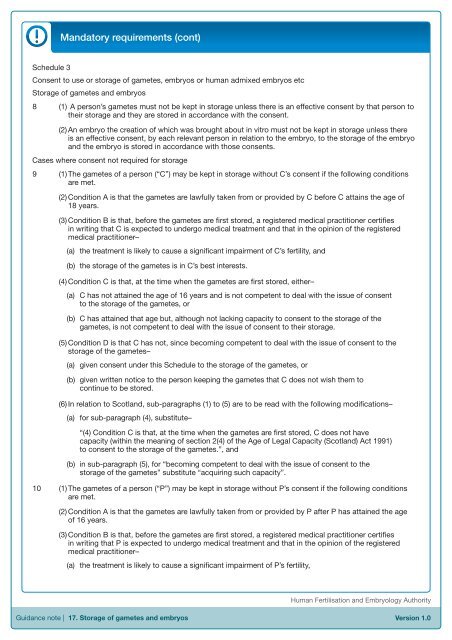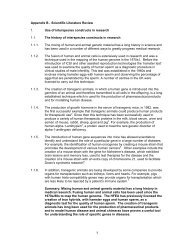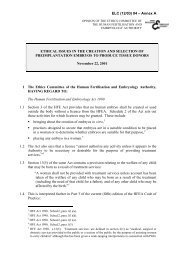Eighth Edition - R.3 - Human Fertilisation & Embryology Authority
Eighth Edition - R.3 - Human Fertilisation & Embryology Authority
Eighth Edition - R.3 - Human Fertilisation & Embryology Authority
Create successful ePaper yourself
Turn your PDF publications into a flip-book with our unique Google optimized e-Paper software.
Mandatory requirements (cont)<br />
Schedule 3<br />
Consent to use or storage of gametes, embryos or human admixed embryos etc<br />
Storage of gametes and embryos<br />
8 (1) A person’s gametes must not be kept in storage unless there is an effective consent by that person to<br />
their storage and they are stored in accordance with the consent.<br />
(2) An embryo the creation of which was brought about in vitro must not be kept in storage unless there<br />
is an effective consent, by each relevant person in relation to the embryo, to the storage of the embryo<br />
and the embryo is stored in accordance with those consents.<br />
Cases where consent not required for storage<br />
9 (1) The gametes of a person (“C”) may be kept in storage without C’s consent if the following conditions<br />
are met.<br />
(2) Condition A is that the gametes are lawfully taken from or provided by C before C attains the age of<br />
18 years.<br />
(3) Condition B is that, before the gametes are first stored, a registered medical practitioner certifies<br />
in writing that C is expected to undergo medical treatment and that in the opinion of the registered<br />
medical practitioner–<br />
(a)<br />
the treatment is likely to cause a significant impairment of C’s fertility, and<br />
(b)<br />
the storage of the gametes is in C’s best interests.<br />
(4) Condition C is that, at the time when the gametes are first stored, either–<br />
(a) C has not attained the age of 16 years and is not competent to deal with the issue of consent<br />
to the storage of the gametes, or<br />
(b)<br />
C has attained that age but, although not lacking capacity to consent to the storage of the<br />
gametes, is not competent to deal with the issue of consent to their storage.<br />
(5) Condition D is that C has not, since becoming competent to deal with the issue of consent to the<br />
storage of the gametes–<br />
(a) given consent under this Schedule to the storage of the gametes, or<br />
(b)<br />
given written notice to the person keeping the gametes that C does not wish them to<br />
continue to be stored.<br />
(6) In relation to Scotland, sub-paragraphs (1) to (5) are to be read with the following modifications–<br />
(a) for sub-paragraph (4), substitute–<br />
“(4) Condition C is that, at the time when the gametes are first stored, C does not have<br />
capacity (within the meaning of section 2(4) of the Age of Legal Capacity (Scotland) Act 1991)<br />
to consent to the storage of the gametes.”, and<br />
(b)<br />
in sub-paragraph (5), for “becoming competent to deal with the issue of consent to the<br />
storage of the gametes” substitute “acquiring such capacity”.<br />
10 (1) The gametes of a person (“P”) may be kept in storage without P’s consent if the following conditions<br />
are met.<br />
(2) Condition A is that the gametes are lawfully taken from or provided by P after P has attained the age<br />
of 16 years.<br />
(3) Condition B is that, before the gametes are first stored, a registered medical practitioner certifies<br />
in writing that P is expected to undergo medical treatment and that in the opinion of the registered<br />
medical practitioner–<br />
(a) the treatment is likely to cause a significant impairment of P’s fertility,<br />
<strong>Human</strong> <strong>Fertilisation</strong> and <strong>Embryology</strong> <strong>Authority</strong><br />
Guidance note | 17. Storage of gametes and embryos<br />
Version 1.0

















